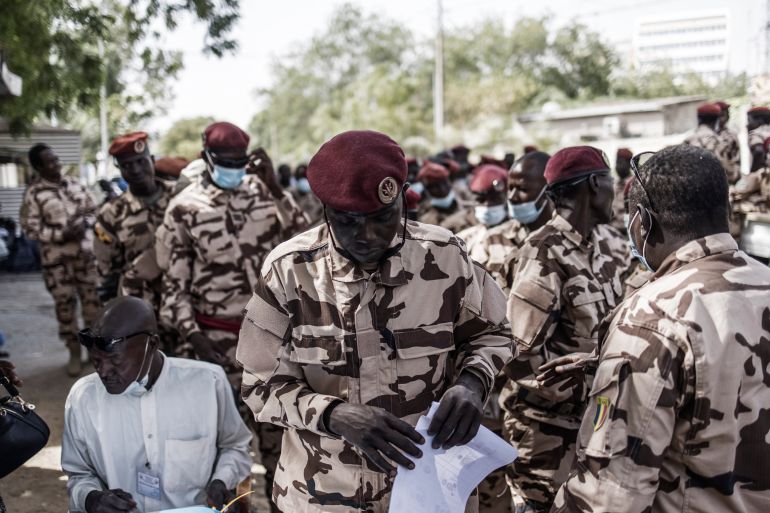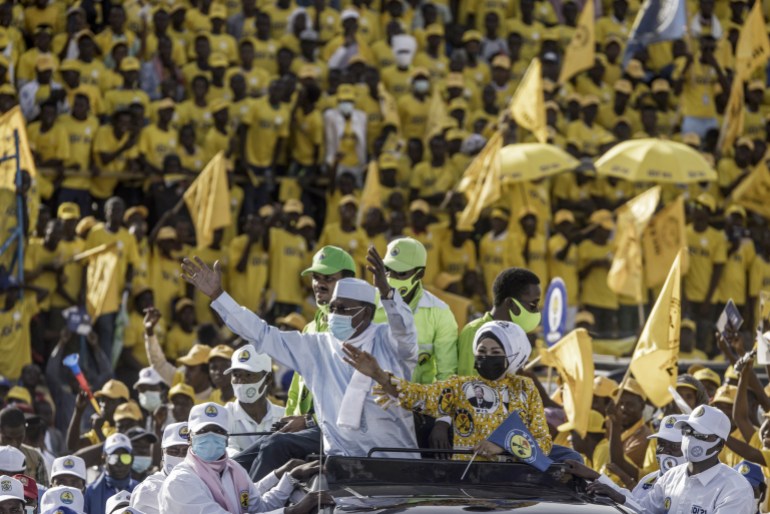Chad counts votes as President Deby seeks to extend 30-year rule
Election kicks off amid mounting popular discontent and opposition criticism against incumbent Deby.

Votes are being counted in Chad following a presidential election in which incumbent Idriss Deby is widely expected to extend his 30-year rule despite growing signs of popular discontent and criticism over his handling of oil wealth.
Election officials began counting ballots at a polling station in centre of the capital N’Djamena immediately after polls closed, watched by a group of observers, the Reuters news agency reported.
Keep reading
list of 3 itemsChad opposition leader quits presidential race after shoot-out
Chad’s Deby seeks sixth term as calls for change mount
The election commission has until April 25 to announce provisional results.
Deby, 68, was the first to cast his ballot at a polling station in the capital N’Djamena. He is one of Africa’s longest-serving leaders and an ally of Western powers in the fight against armed groups in West and Central Africa.
“I’m calling on all Chadians to come out and vote for the candidate of their choice who will have to tackle the major challenges facing our country over the next six years,” Deby told journalists after voting.
Deby came to power spearheading the rebellion that overthrew longtime military ruler Hissene Habre in 1990. He won elections in 1996 and again in 2001 before pushing through a constitutional change in 2018 that could allow him to stay in power until 2033.
He has relied on a firm grip over state institutions and one of the region’s most capable militaries to maintain power. He said recently he knew in advance that he would win again “as I have done for the last 30 years”.
Among Deby’s six rivals is former prime minister Albert Pahimi Padacke, but several leading opponents are boycotting the race, including the 2016 runner-up Saleh Kebzabo, quit in protest over violence by the security forces and has vowed to make Chad “ungovernable” if Deby wins.
Kebzabo and opposition leader Ngarlejy Yorongar pulled out of the race after a violent arrest attempt of another candidate, Yaya Dillo, in late February.
Lydie Beassemda, 54, a former minister of agricultural production, is the first woman to run for president in Chad’s history.

Opposition calls for boycott
Observers are closely watching the turnout after several recent anti-government demonstrations turned violent. A heavy military presence patrolled the capital on Sunday.
Hundreds lined up as polling stations opened, according to Al Jazeera’s Hiba Morgan, reporting from the capital N’Djamena.
“But the crowd is now smaller and has reduced with just a few people coming in and out,” Morgan said, adding that the opposition has called the 7.3 million people who registered to vote to boycott the election.
“They have called for people to march to the electoral commission to voice their agitation and frustration over the whole [electoral] process,” she said.
“Human Rights Watch and Amnesty International both said that there was intimidation around the election campaign and that people were not free to express their opinion, especially opposition candidates,” Morgan added.
Protests against Deby’s administration have mounted since February with a coalition of NGOs, labour unions and opposition political parties calling for a change in political leadership and an end to social and economic injustices.
Authorities have “ruthlessly” responded with crackdowns on protesters, Human Rights Watch said in a report this week.
On Thursday, the United States urged Chad’s election supervisors and courts “to ensure these elections are conducted freely, fairly, and transparently”.
The United Nations has called for an investigation after security forces went to arrest Dillo, a former minister in Deby’s government.
Dillo and other witnesses said security forces killed the politician’s mother and son and wounded several others. The government has said Dillo’s son was not killed in the raid.
Late on Thursday, the government said it had arrested several opposition politicians accused of planning “terrorist attacks” against the electoral commission’s headquarters and the ransacking of polling stations.